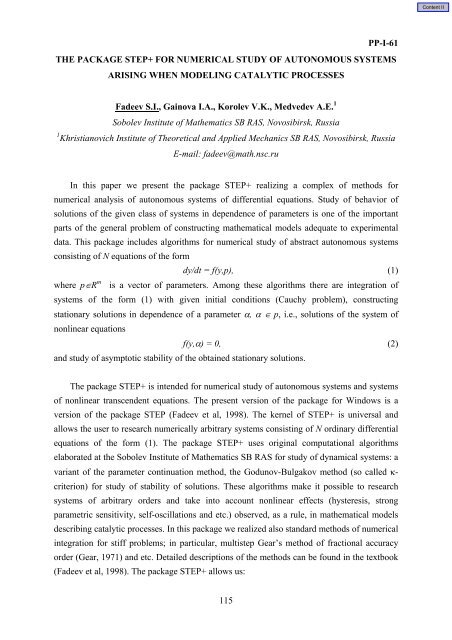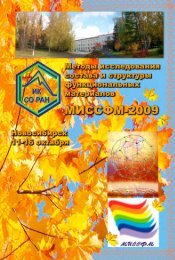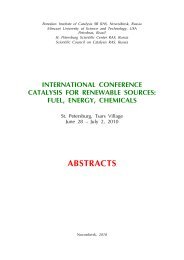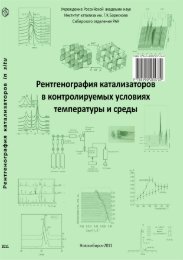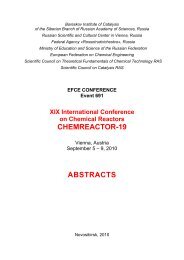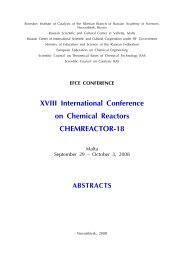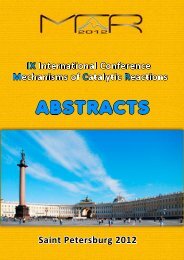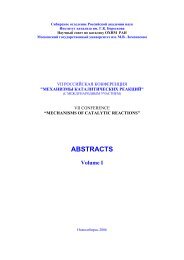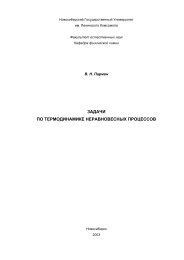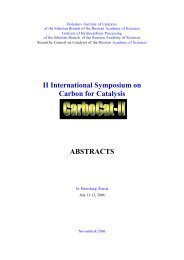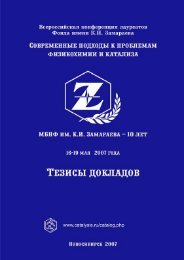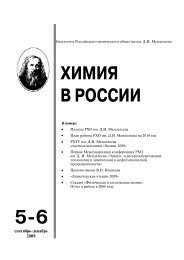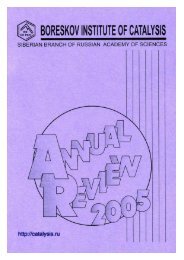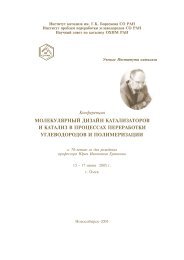- Page 1 and 2:
"Catalysis is not a branch of chemi
- Page 3 and 4:
Siberian Branch of Russian Academy
- Page 5 and 6:
INTERNATIONAL ADVISORY COMMITTEE:A.
- Page 7:
POSTER PRESENTATIONSSECTION IMECHAN
- Page 10 and 11:
PP-I-1more time in the oxidised sta
- Page 12 and 13:
PP-I-2Study of chemical reactions p
- Page 14 and 15:
PP-I-3It is suggested that during p
- Page 16 and 17:
PP-I-4reaction conditions, 100% con
- Page 18 and 19:
PP-I-5Catalytic properties of synth
- Page 20 and 21:
PP-I-6iii) The magnitude of above m
- Page 22 and 23:
PP-I-8ONE-DIMENSIONAL AND THREE-DIM
- Page 24 and 25:
PP-I-8This work was carried out at
- Page 26 and 27:
PP-I-9formed on their place. The PI
- Page 28 and 29:
PP-I-10CatalystЕа 1 ,kJ/mol(77÷1
- Page 30 and 31:
PP-I-11to increase of selectivity t
- Page 32 and 33:
PP-I-12The nanostructure of CS (clu
- Page 34 and 35:
PP-I-13The exchange in high-tempera
- Page 36 and 37:
PP-I-15ROLE OF CARBON DIOXIDE IN TH
- Page 38 and 39:
PP-I-16DIRECT OXIDATION OF BENZENE
- Page 40 and 41:
PP-I-17DFT STUDY OF REDUCTION REACT
- Page 42 and 43:
PP-I-18ORIGINAL MONTE CARLO METHOD
- Page 44 and 45:
PP-I-19STUDY ON THE MECHANISM OF TH
- Page 46 and 47:
PP-I-20NANOSIZED METAL OXIDES AS ST
- Page 48 and 49:
PP-I-21THE STUDYING OF THE NATURE O
- Page 50 and 51:
PP-I-22SYNTHESIS OF ETHYLENE-BUTADI
- Page 52 and 53:
PP-I-24REACTION OF PHENYLACETYLENE
- Page 54 and 55:
PP-I-25EFFECT OF THE PRESSURE ON TH
- Page 56 and 57:
PP-I-26INTERPRETATION OF THE ETHYLE
- Page 58 and 59:
PP-I-27STUDY OF ONE-POT REDUCTIVE D
- Page 60 and 61:
PP-I-28TUNING SURFACE MORPHOLOGY OF
- Page 62 and 63:
PP-I-29HIGHLY POROUS BLOCK CELLULAR
- Page 64 and 65:
PP-I-30STRUCTURE OF PHOTOCATALYTIC
- Page 66 and 67: PP-I-31According to the 13 C MAS NM
- Page 68 and 69: PP-I-32Conversion and selectivity a
- Page 70 and 71: PP-I-34STUDY OF THE MECHANISM OF CA
- Page 72 and 73: PP-I-35COMPARISON CATALYTIC ACTIVIT
- Page 74 and 75: PP-I-36CRITICAL PHENOMENA FOR LANGM
- Page 76 and 77: PP-I-37ISOTHERMS FOR STEPPED SURFAC
- Page 78 and 79: PP-I-38RESOLUTION OF CHIRAL SULFOXI
- Page 80 and 81: PP-I-39INVESTIGATION OF AMINO-CONTA
- Page 82 and 83: PP-I-40APPLICATION OF POSITRON ANNI
- Page 84 and 85: PP-I-41large pores (15-100 μm) of
- Page 86 and 87: PP-I-42 Pd(1x2) Pd(1x1) Pd(1x2)-c
- Page 88 and 89: PP-I-43the Al/Zr molar ratio has an
- Page 90 and 91: PP-I-44transferred on nickel throug
- Page 92 and 93: PP-I-45S BET , XRD, TPR, SEM, TEM a
- Page 94 and 95: PP-I-46normal and branched alkanes
- Page 96 and 97: PP-I-47growth stages (2) and (3) -
- Page 98 and 99: PP-I-48system operated at frequenci
- Page 100 and 101: PP-I-49The reactivity of these mate
- Page 102 and 103: PP-I-51RECONSTRUCTION OF THE Pd(pol
- Page 104 and 105: PP-I-53INTERMEDIATE PRODUCTS IN PAR
- Page 106 and 107: PP-I-55MOLECULAR MECHANISM OF LOW T
- Page 108 and 109: PP-I-56size of metals encapsulated
- Page 110 and 111: PP-I-57activity of synthetic cataly
- Page 112 and 113: PP-I-58us to suggest that oxidation
- Page 114 and 115: PP-I-59characteristics are as follo
- Page 118 and 119: PP-I-611) using the parameter conti
- Page 120 and 121: PP-I-62atoms to PhePA molecule. In
- Page 122 and 123: PP-I-63interaction of CO molecule b
- Page 124 and 125: PP-I-64cases method of Coats-Redfer
- Page 126 and 127: PP-I-65adsorbates and metal atoms.
- Page 128 and 129: PP-I-66were extrapolated then to th
- Page 130 and 131: PP-I-67account an influence of oxyg
- Page 132 and 133: PP-I-68been considered. With this a
- Page 134 and 135: PP-I-70MODIFICATION OF ELECTRONIC S
- Page 136 and 137: PP-I-71most of described methods ch
- Page 138 and 139: PP-I-72Table 1Polymeric active carb
- Page 140 and 141: PP-I-73lower than 450 °C with prac
- Page 142 and 143: PP-I-74Fig. 1. Optimized structure
- Page 144 and 145: PP-I-75(Zn Z d ). The catalytic cyc
- Page 146 and 147: PP-I-76Photocatalytic reaction was
- Page 148 and 149: PP-I-78FRAGMENT COMPOSITION OF DIES
- Page 150 and 151: PP-I-79QUANTUM-CHEMICAL STUDIES OF
- Page 152 and 153: PP-I-80INFUENCE OF CHEMICAL TREATME
- Page 154 and 155: PP-I-81ADSORPTION OF SMALL SILVER S
- Page 156 and 157: PP-I-82EXPLOSION SAFETY IN GAS TRAN
- Page 158 and 159: PP-I-83(ONNO) ad → N 2 O ad + O a
- Page 161 and 162: CATALYTIC ACTIVATION OF UNFAVOURABL
- Page 163 and 164: PP-II-1Therefore, the observed incr
- Page 165 and 166: PP-II-2The samples of uranium oxide
- Page 167 and 168:
PP-II-3catalysts prepared by hydrot
- Page 169 and 170:
PP-II-4[(C 6 H 5 ) 2 (CH 2 =CHSi] 2
- Page 171 and 172:
PP-II-6THE NEW Ni, Zr, Ti-CONTAININ
- Page 173 and 174:
PP-II-7SPATIALLY RESOLVED UV-VIS MI
- Page 175 and 176:
PP-II-8POLYOL MEDIATED SYNTHESIS OF
- Page 177 and 178:
PP-II-8CuO phase were detected, sug
- Page 179 and 180:
PP-II-9SHS-INTERMETALLIDES ON THE B
- Page 181 and 182:
PP-II-10CO OXIDATION IN HYDROGEN ST
- Page 183 and 184:
PP-II-11CATALYTIC PERFORMANCE OF CO
- Page 185 and 186:
PP-II-12FORMATION OF RADICAL CATION
- Page 187 and 188:
CATALYSTS MOLECULAR DESIGN BY SURFA
- Page 189 and 190:
PP-II-14THE CATALYTIC ACTIVITY OF F
- Page 191 and 192:
OXIDATION TRIMETHYLHYDROHYNONE IN T
- Page 193 and 194:
PP-II-16TECHNOLOGY CONCEPTS ON DEVE
- Page 195 and 196:
ACTIVATION OF POST-TITANOCENE OLEFI
- Page 197 and 198:
STRUCTURE FEATURES OF NANOCRYSTALLI
- Page 199 and 200:
THE H 2 ROLE IN SELECTIVE NO X REDU
- Page 201 and 202:
PP-II-20THE IN SITU FTIR STUDY OF T
- Page 203 and 204:
PP-II-21LUMINESCENT DIAGNOSTICS OF
- Page 205 and 206:
PP-II-22MODIFICATION OF PROPERTIES
- Page 207 and 208:
PP-II-23FTIR STUDY OF THE REACTION
- Page 209 and 210:
PP-II-24pores (the average diameter
- Page 211 and 212:
PP-II-25and the amount of the disso
- Page 213 and 214:
PP-II-27ACTIVITY OF PALLADIUM CATAL
- Page 215 and 216:
MODIFIED POLYOXIDE CATALYSTS FOR SY
- Page 217 and 218:
PP-II-29PRODUCTION OF HYDROGENCONTA
- Page 219 and 220:
INFLUENCE OF COMPOSITION AND STRUCT
- Page 221 and 222:
PP-II-311NEW COMPOSITE OF A POLYACE
- Page 223 and 224:
SOME ASPECTS OF THE SELECTION OF ST
- Page 225 and 226:
PP-II-33HYDROTREATING CATALYSTS MOD
- Page 227 and 228:
PP-II-34NORBORNADIENE IN NEW SHAPE-
- Page 229 and 230:
PP-II-36CATALYTIC SYSTEMS BASED ON
- Page 231 and 232:
PP-II-37EFFECT OF PHYSIOCHEMICAL PR
- Page 233 and 234:
PP-II-38INVESTIGATION OF STRUCTURE
- Page 235 and 236:
PP-II-38As a result of the combined
- Page 237 and 238:
PP-II-39synthesized by deposition-p
- Page 239 and 240:
PP-II-40halogen in NiX 2 (PPh 3 ) 2
- Page 241 and 242:
PP-II-41fell cell - with the requir
- Page 243 and 244:
PP-II-42SYNTHESIS OF CATALYSTS ON T
- Page 245 and 246:
PP-II-43-crucial role play peroxide
- Page 247 and 248:
PP-II-44According to the obtained d
- Page 249 and 250:
PP-II-46CYCLOALUMINATION OF α,ω-D
- Page 251 and 252:
PP-II-47ETHYLENE OLIGOMERIZATION TO
- Page 253 and 254:
PP-II-48aluminas are in the range o
- Page 255 and 256:
PP-II-49synthesis methods such as s
- Page 257 and 258:
PP-II-50Here, we report the first s
- Page 259 and 260:
PP-II-51hydrogenation. This peculia
- Page 261 and 262:
PP-II-524% and higher. Apparently t
- Page 263 and 264:
PP-II-53The secondary methods are b
- Page 265 and 266:
PP-II-55NOVEL CHIRAL NITROGEN CONTA
- Page 267 and 268:
PP-II-56NON-OXIDATIVE METHANE CONVE
- Page 269 and 270:
PP-II-57THE CATALYTIC ACTIVITY OF P
- Page 271 and 272:
PP-II-58The analysis of the raw mat
- Page 273 and 274:
PP-II-59analysis. Specific surface
- Page 275 and 276:
PP-II-60Ni-U catalysts were shown t
- Page 277 and 278:
PP-II-61Deep oxidation of CB vapors
- Page 279 and 280:
PP-II-62precipitate at 100 o C favo
- Page 281 and 282:
PP-II-63Х X n-С н-C 6 , %1008060
- Page 283 and 284:
PP-II-64mixture by microwave radiat
- Page 285 and 286:
PP-II-65and 99.995 % mass.) were sa
- Page 287 and 288:
PP-II-66CATALYTIC SYSTEMS BASED ON
- Page 289 and 290:
PHASE ANALYSIS OF MULTIELEMENT CATA
- Page 291 and 292:
PP-II-68EFFECT OF THE LIGAND SUBSTI
- Page 293 and 294:
PP-II-69Results and discussion: The
- Page 295 and 296:
PP-II-70tests in POM reaction and T
- Page 297 and 298:
PP-II-71The acidity, measured by tw
- Page 299 and 300:
PP-II-72The effect of nature and ac
- Page 301 and 302:
PP-II-74STUDY OF METHANE DEHYDROARO
- Page 303 and 304:
PP-II-75CATALYTIC OXIDATION OF ORGA
- Page 305 and 306:
Knowledge of the surface VO x speci
- Page 307 and 308:
PP-II-77propylene polymerization on
- Page 309 and 310:
THE EFFECT OF THE SUPPORT ON THE PE
- Page 311 and 312:
THE ACIDIC CATALYSIS IN REACTION OF
- Page 313 and 314:
HYDROGEN-RICH GAS PURIFICATION FROM
- Page 315 and 316:
PP-II-82During the stage of combine
- Page 317 and 318:
PP-II-83higher H 2 /propane ratios
- Page 319 and 320:
NANOSTRUCTURED MATERIALS BASED ON Z
- Page 321 and 322:
ELECTROCATALYTIC REDUCTION OF NITRO
- Page 323 and 324:
PP-II-87with CuKα radiation (λ ~
- Page 325 and 326:
PP-II-88The properties of the catal
- Page 327 and 328:
PP-II-89The stereospecificity of po
- Page 329 and 330:
PP-II-91SYNTHESIS AND CHARACTERIZAT
- Page 331 and 332:
PP-II-92INFLUENCE OF NATURE OF HETE
- Page 333 and 334:
PP-II-93OPTICALLY ACTIVE AMMONIUM S
- Page 335 and 336:
PP-II-94THE INFLUENCE OF FORMING CO
- Page 337 and 338:
PP-II-95NEW CATALYST OF LOW-TEMPERA
- Page 339 and 340:
PP-II-96DRIFTS AND UV-VIS STUDY OF
- Page 341 and 342:
PP-II-97NANOSTRUCTURED COMPLEX OXID
- Page 343 and 344:
PLATINUM CATALYSTS AND THEIR ACTIVI
- Page 345 and 346:
PP-II-99DESIGN OF STRUCTURED CATALY
- Page 347 and 348:
PP-II-100THE INFLUENCE OF CARBON ON
- Page 349 and 350:
PP-II-100sp 2 -carbon samples (Sibu
- Page 351 and 352:
PP-II-101Undoped LaMnO 3 has a stru
- Page 353 and 354:
PP-II-102The redox mechanisms of ca
- Page 355 and 356:
PP-II-103weak surface complexes of
- Page 357 and 358:
PP-II-104Ellipsometric, LA-XRD, TEM
- Page 359 and 360:
357PP-II-105It follows that MAO (or
- Page 361 and 362:
PP-II-106For the description of met
- Page 363 and 364:
361PP-II-1070.75, 1) were prepared
- Page 365 and 366:
PP-II-108(K⋅10 6 l/mole⋅mg⋅eq
- Page 367 and 368:
PP-II-110EFFECTS OF THE PROPERTIES
- Page 369 and 370:
PP-II-111CATALYTIC ACTIVITY OF POLY
- Page 371 and 372:
SYNTHESIS OF OXIRANES FROM RENEWABL
- Page 373 and 374:
PP-II-113SELECTIVE OXIDATION OF FOR
- Page 375 and 376:
BIODIESEL PRODUCTION FROM OLEIC ACI
- Page 377 and 378:
PP-II-115THE MECHANISM OF PHENOL OX
- Page 379 and 380:
PP-II-116THERMOSTABILITY OF Pd-ZEOL
- Page 381 and 382:
PP-II-117CO OXIDATION ON CuO-CeO 2
- Page 383 and 384:
PP-II-118THE ROLE OF I-CONTAINING P
- Page 385 and 386:
PP-II-119THE BULK POROUS ELECTRODE
- Page 387 and 388:
PP-II-120Methanol was suggested to
- Page 389 and 390:
PP-II-121Synthesis of catalysts on
- Page 391 and 392:
Yield, %PP-II-122Dynamics of variat
- Page 393 and 394:
PP-II-123The analysis of the hydroc
- Page 395 and 396:
PP-II-125THE MECHANISM OF COPPER CO
- Page 397 and 398:
PP-II-126The problem of the low act
- Page 399 and 400:
PP-II-127size of hydrocatalytic pro
- Page 401 and 402:
PP-II-128enhanced stability against
- Page 403 and 404:
PP-II-130HYDROGEN PRODUCTION BY MET
- Page 405 and 406:
CATALYTIC HYDROALKOXYCARBONYLATION
- Page 407 and 408:
NANOSTRUCTURED METAL-POLYMERIC CATA
- Page 409 and 410:
PP-II-133THE EFFECT OF THE SUPPORT
- Page 411 and 412:
PP-II-134АLTERNATIVE APPROACH TO D
- Page 413 and 414:
PP-II-135THE LOW-TEMPERATURE CATALY
- Page 415 and 416:
CATALYTIC PROPERTIES OF LAYERED OF
- Page 417 and 418:
PP-II-138EFFECT OF Zr ON THE OXIDAT
- Page 419 and 420:
PP-II-139THE NATURE OF ACTION OF TH
- Page 421 and 422:
PP-II-140CYCLOHEXANE OXIDATION OVER
- Page 423 and 424:
PP-II-141Mo AND W HETEROPOLYACID-CO
- Page 425 and 426:
HYDROCARBON CONVERSION CATALYSTS BA
- Page 427 and 428:
PP-II-142selectivity of the hexene-
- Page 429 and 430:
PP-II-143XPS, XRD and UV-Vis DRS st
- Page 431 and 432:
PP-II-144from the surface of sample
- Page 433 and 434:
PP-II-146THE INFLUENCE OF THE ACIDI
- Page 435 and 436:
PP-II-147CHARACTERISATION OF NEW GO
- Page 437 and 438:
STUDY ON THE REGULARITIES OF THE FO
- Page 439 and 440:
PP-II-148Platinum catalysts support
- Page 441 and 442:
PP-II-149selectivity to LHC, moreov
- Page 443 and 444:
PP-II-150steamed until a gel format
- Page 445 and 446:
PP-II-151ELECTRONIC STATE OF Cr n+
- Page 447 and 448:
PP-II-152METAL SUPPORTED CATALYSTS
- Page 449 and 450:
PP-II-153FORECASTING CATALYTIC CHAR
- Page 451 and 452:
RE - CONTENTING HC OXIDATION CATALY
- Page 453 and 454:
PP-II-155reaction are shown on the
- Page 455 and 456:
PP-II-156The product of stereoselec
- Page 457 and 458:
PP-II-157Supporting Pd on ZnO coate
- Page 459 and 460:
PP-II-158relating to acetone. With
- Page 461 and 462:
PP-II-159At the same time, catalyst
- Page 463 and 464:
PP-II-160The aim of our work is to
- Page 465 and 466:
PP-II-161crystallization state of t
- Page 467 and 468:
PP-II-162several carbon materials a
- Page 469:
PP-II-1625. J. M. H. Dirkx, H. S. v
- Page 473 and 474:
PP-III-1INFLUENCE OF DISSOLVED OXYG
- Page 475 and 476:
PP-III-2and microstructure, oxidati
- Page 477 and 478:
PP-III-3Aerosol, vapour of toxiccom
- Page 479 and 480:
PP-III-4inserted in PAn either in t
- Page 481 and 482:
PP-III-5The mechanism of pyrolysis
- Page 483 and 484:
ELECTROCATALYSTS WITH LOW PLATINUM
- Page 485 and 486:
PP-III-8VERY PURE SILICA FIBROUS AS
- Page 487 and 488:
PP-III-9METAL CONTAINING ZEOLITES -
- Page 489 and 490:
THE INFLUENCE OF TREATMENT METHOD O
- Page 491 and 492:
PARA-HYDROGEN INDUCED POLARIZATION
- Page 493 and 494:
PP-III-12NOVEL CHITOSAN-BASED CATAL
- Page 495 and 496:
PP-III-13Fig. 1. Dark adsorption (1
- Page 497 and 498:
PP-III-14residual pressure of 0.67
- Page 499 and 500:
PP-III-15using the same feedstock.
- Page 501 and 502:
PP-III-16Fig. 2. SEM-images of surf
- Page 503 and 504:
EPOXIDATION OF RAPESEED OIL BY HYDR
- Page 505 and 506:
PP-III-19THE PECULIARITIES OF CATAL
- Page 507 and 508:
PP-III-20CATALYTIC MEMBRANE CONTACT
- Page 509 and 510:
PP-III-21CATALYTIC ACTIVE LAYERS ON
- Page 511 and 512:
PP-III-22MODIFICATION OF COMPOUNDED
- Page 513 and 514:
EFFECT OF LIQUID POLYKETONE ON THE
- Page 515 and 516:
CATALYSTS SEARCH FOR α-METYLBENZYL
- Page 517 and 518:
PP-III-25PARTIAL OXIDATION OF PROPA
- Page 519 and 520:
PP-III-27BIODIESEL SYNTHESIS BY CAT
- Page 521 and 522:
PP-III-28PRODUCTION OF BIO-SYNGAS V
- Page 523 and 524:
PP-III-28Fig. 1. Changes in Н 2 an
- Page 525 and 526:
PP-III-29Table 1: Texture and adsor
- Page 527 and 528:
PP-III-30dimensionless front veloci
- Page 529 and 530:
PP-III-31synthesized. Experiments h
- Page 531 and 532:
PP-III-32It is established, that cr
- Page 533 and 534:
PP-III-33adsorptive catalysts in ad
- Page 535 and 536:
PP-III-34turbocompressor and two ca
- Page 537 and 538:
PP-III-35The Cu, Ni/ γ -Al 2 O 3 c
- Page 539 and 540:
PP-III-36pressure at 800-900 o C. T
- Page 541 and 542:
PP-III-370,50Concentration / Vol.-%
- Page 543 and 544:
PP-III-38HETEROGENEOUS-CATALYTIC DE
- Page 545 and 546:
PP-III-39HYDROISOMERIZATION OF CATA
- Page 547 and 548:
METHOD OF CATALYTIC UTILIZATION OF
- Page 549 and 550:
PP-III-41Catalytic properties of Fe
- Page 551 and 552:
PP-III-42heat in a steam-power unit
- Page 553 and 554:
PP-III-43In this way, the content o
- Page 555 and 556:
PP-III-45THE ECOLOGIC AND ECONOMIC
- Page 557 and 558:
PP-III-46INFLUENCE OF SUPPORT NATUR
- Page 559 and 560:
PP-III-47MIGRATION OF SUPPORTED PLA
- Page 561 and 562:
Table 2.PP-III-47The [Pt]/[Al] atom
- Page 563 and 564:
PP-III-48Under nitrogen atmosphere
- Page 565 and 566:
PP-III-49With aim to achieve the ho
- Page 567 and 568:
PP-III-50clinoptilolite (Aydag depo
- Page 569 and 570:
PP-III-51References1. Balzhinimaev
- Page 571 and 572:
PP-III-52Black light UV lamps. The
- Page 573 and 574:
USE OF THE NITROGEN-CONTAINING CARB
- Page 575 and 576:
PP-III-54CATALYTIC BEHAVIOUR OF VAR
- Page 577 and 578:
PP-III-55and sulfur, was spent (fig
- Page 579 and 580:
PP-III-56Specific reaction rates of
- Page 581 and 582:
PP-III-57special catalyst system wi
- Page 583 and 584:
PP-III-59UTILIZATION OF WASTE BIOMA
- Page 585 and 586:
MECHANOCHEMISTRY AND MECHANO-CATALY
- Page 587 and 588:
PP-III-62CATALYTIC INTENSIFICATION
- Page 589 and 590:
PP-III-64ABOUT WHAT MANUFACTURE OF
- Page 591 and 592:
PP-III-65OXDATIVE CONVERSION OF HYD
- Page 593 and 594:
PP-III-66COMPLEX QUALITY CONTROL SY
- Page 595 and 596:
PP-III-67INFLUENCE OF DIFFUSION, SI
- Page 597 and 598:
PP-III-68ONE STEP PROCESS FOR HYDRO
- Page 599 and 600:
FEATURES OF DRAG FACTOR FOR COMPLEX
- Page 601 and 602:
FIXED BED REACTORS WITH GRADIENT CA
- Page 603 and 604:
PP-III-70respective variational pro
- Page 605 and 606:
PP-III-71Operation at high volumetr
- Page 607 and 608:
PP-III-72It was performed the optim
- Page 609 and 610:
PP-III-73production stages of refin
- Page 611 and 612:
pik⎛N= fi ⎜∑j ∑⎝ j=1Nik,
- Page 613 and 614:
PP-III-75three MCP’s. In the seco
- Page 615 and 616:
PP-III-76during the reaction. The i
- Page 617 and 618:
PP-III-77enthalpy calculated for va
- Page 619 and 620:
PP-III-78calculating kinetics of pa
- Page 621 and 622:
PP-III-79ventilators 7 and 10, flam
- Page 623 and 624:
PP-III-801) C 6 H 5 CH 3 + 2 [YO]
- Page 625 and 626:
PP-III-81Δm/m coating, %204060V=0.
- Page 627 and 628:
PP-III-82• diameter of its genera
- Page 629 and 630:
PP-III-83ΔP,1mm H 2 O/m40023003420
- Page 631 and 632:
Concentration, vol.%PP-III-84The ef
- Page 633 and 634:
PP-III-85autocatalyst of thermoconv
- Page 635 and 636:
PP-III-86The influence of such para
- Page 637 and 638:
PP-III-87hydrocarbons increases wit
- Page 639 and 640:
AUTOWAVE PROCESSES IN A STATIC CATA
- Page 641 and 642:
PP-III-90KINETIC AND THERMODYNAMIC
- Page 643 and 644:
PP-III-91which mathematical descrip
- Page 645 and 646:
PP-III-93UTILIZATION OF LARGE-SCALE
- Page 647 and 648:
CATALYTIC TECHNOLOGY OF UTILIZATION
- Page 649 and 650:
PP-III-95PROPERTIES AND ACTIVITY OF
- Page 651 and 652:
PREPARATION AND CHARACTERIZATION OF
- Page 653 and 654:
PP-III-98The comparison of TPR runs
- Page 655:
ADVERTISEMENT
- Page 658 and 659:
PerformancePassionSuccessAutomotive
- Page 660 and 661:
Обслуживаемые рынк
- Page 662:
Polyurethanes are an integral part
- Page 666 and 667:
− prehydrotreating of gasolines a
- Page 668 and 669:
Kovalyov E. 123Kovtunov K. 489Kozlo
- Page 670 and 671:
List ofparticipantsABRAMOVA Anna Vs
- Page 672 and 673:
BOEVA Olga AnatolievnaD.I. Mendelee
- Page 674 and 675:
DJEKIC TanjaEindhoven University of
- Page 676 and 677:
GIMUNDINOV Shamil AbzalovichD.V. So
- Page 678 and 679:
KACHEVSKY Stanislav AndreevichLomon
- Page 680 and 681:
KONEV Vasily NikolayevichBoreskov I
- Page 682 and 683:
LEDOUX Marc-JacquesCNRS DPI3 Rue Mi
- Page 684 and 685:
MIERCZYŃSKI PawełInstitute of Gen
- Page 686 and 687:
OBYSKALOVA Elina AnatolievnaBoresko
- Page 688 and 689:
REBROV EvgenyEindhoven University o
- Page 690 and 691:
SHALAGINA Anastasia EvgenievnaBores
- Page 692 and 693:
SPIRIDONOV Alexey AlexeevichBoresko
- Page 694 and 695:
VEDYAGIN Alexei Anatol'evichBoresko
- Page 696 and 697:
ZAKHARENKO Valery SemenovitchBoresk
- Page 698 and 699:
Volume IVolume IICONTENTPOSTER PRES
- Page 700 and 701:
PP-I-25 Hocine S., Cherifi O., Bett
- Page 702 and 703:
PP-I-52 Timoshenkov S.P., Artemov E
- Page 704 and 705:
PP-I-80 Shinkarev V.V., Kuvshinov G
- Page 706 and 707:
PP-II-21 Chistoforova N.V., Yelkina
- Page 708 and 709:
PP-II-45 Khachani M., Boucetta C.,
- Page 710 and 711:
PP-II-68 Malinskaya M.Ju., Sviridov
- Page 712 and 713:
PP-II-90 Nikitin V., Mikenas T., Za
- Page 714 and 715:
PP-II-114 Sepúlveda J., Santarosa
- Page 716 and 717:
PP-II-139 Tkach V.S., Suslov D.S.,
- Page 718 and 719:
Section III. Environmental and indu
- Page 720 and 721:
PP-III-28 Yakovlev V.A., Kirillov V
- Page 722 and 723:
PP-III-52 Shelimov B., Tolkachev N.
- Page 724 and 725:
PP-III-77 Mel’gunov M., Kovalev M
- Page 726:
III International Conference“Cata


